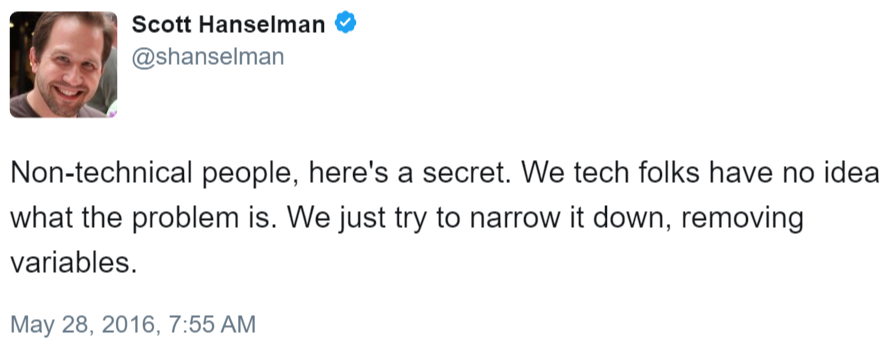
A few days ago, I read this article shared by a friend: Kids can't use computers... and this is why it should worry you. I had already read this article from 2013. It describes the lack of understanding of how computers work in the newer generations.
The scene
One sentence got my attention this time. Here's the incriminated part of the article where a student asks a teacher for help setting up the Wifi on her Macbook:
Student: 'Oh... I guess these days you must find that the kids know more about computers than the teachers....' [...]
Teacher: Normally when someone spouts this rubbish I just nod and smile. This time I simply couldn't let it pass. 'Not really, most kids can't use computers.' (and neither can you - I didn't add.)
She looked surprised by my rejection of what is generally considered a truism. After all, aren't all teenagers digital natives? They have laptops and tablets and games consoles and smart phones, surely they must be the most technologically knowledgeable demographic on the planet. The bell went, and I really did have a lesson to teach, so I didn't have time to explain to her my theories on why it is that kids can't use computers. Maybe she'll read my blog.
The truth is, kids can't use general purpose computers, and neither can most of the adults I know.
In the sentence highlighted here above, the author makes a shortcut between "being able to use a computer" and "being a digital native":
After all, aren't all teenagers digital natives? They have laptops and tablets and games consoles and smart phones, surely they must be the most technologically knowledgeable demographic on the planet.
The author is right, if I need to know how to best use [Insert here a new and shiny service] to expand my reach among my friends, those "digital natives" might come in handy.
Problem is, the article in itself is criticizing the lack of deep knowledge about the computer itself, the lack of understanding of how the computer works. Unfortunately, this mix-up between "using" and "knowing" is quite common when using this "digital native" term... and it kind of misleads the reader onto shaky grounds.
Digital Native
Let's try to define it. Many sites define it as "kids born since the widespread of IT i.e. after the 80s", which is not accurate. The first definition that caught my eyes is the one by Techopedia:
A digital native is an individual who was born after the widespread adoption of digital technology. The term digital native doesn't refer to a particular generation. Instead, it is a catch-all category for children who have grown up using technology like the Internet, computers and mobile devices. This exposure to technology in the early years is believed to give digital natives a greater familiarity withand understanding of technology than people who were born before it was widespread.
This definition rejects the idea of a digital native generation. You are not a Digital Native because you were born after the 80s, but because grew up in a digital-heavy world. But still, no distinction of using versus knowing.
Let's read the Wikipedia definition:
The term digital native was coined and popularized by education consultant Prensky in his 2001 article entitled Digital Natives, Digital Immigrants, in which he relates the contemporary decline in American education to educators' failure to understand the needs of modern students. His article posited that "the arrival and rapid dissemination of digital technology in the last decade of the 20th century" had changed the way students think and process information, making it difficult for them to excel academically using the outdated teaching methods of the day. In other words, children raised in a digital, media-saturated world, require a media-rich learning environment to hold their attention, and Prensky dubbed these children "digital natives". Contextually, his ideas were introduced after a decade of worry over increased diagnosis of children with ADD and ADHD,[2] which itself turned out to be largely overblown.[3] Prensky did not strictly define the digital native in his 2001 article, but it was later, arbitrarily, applied to children born after 1980, because computer bulletin board systems and Usenet were already in use at the time. The idea became popular among educators and parents, whose children fell within Prensky's definition of a digital native, and has since been embraced as an effective marketing tool.[4] It is important to note that Prensky's original paper was not a scientific one, and that no empirical data exists to support his claims. He has since abandoned his digital native metaphor in favor of digital wisdom.[5] More recently the Digital Visitor and Resident idea has been proposed as an alternative to understanding the various ways individuals engage with digital technology.
This last definition finally gives some hint of the context this term was coined in: to highlight the difference between native and acquired speakers of the digital language and the pain points of the interface between them in academia. It speaks of holding attention and the way those individuals process information. But I think this quote from Mark Prensky's paper speaks it out even more clearly:
Our students have changed radically. Today’s students are no longer the people our educational system was designed to teach. [...] our Digital Immigrant instructors, who speak an outdated language (that of the pre-digital age), are struggling to teach a population that speaks an entirely new language". (Digital Natives, Digital Immigrants, Marc Prensky 2001)
There we have it, this term - as it was coined - entirely related to using technology, not knowing it per se. It was coined to differentiate between "seeing the digital world as it is" versus "seeing a digital world and translating it to our former non-digital understanding of it".
From a "digital native" to a "problem solving" issue
The use of "digital native" in this article and in this context is not only entirely misleading but it is also completely representative of how the media twisted this term for their own use ; as a shortcut to "semigod-with-technology", which it is not.
Let's leave aside this vocabulary war to speak about
the essence of the article. The article focuses on a lack of IT-skills and understanding. This is a symptom, not the source of the problems.
The common enemy here is lack of problem solving skills, not the lack of IT skills. The problem is not "not being able to fix your wifi & proxy" (the example of the article), but not being able to find out how to fix it and even worse, not being interested in the solution.
I love this tweet from Scott Hanselman:

Where I finally agree with the author if this article, is that this lack of problem solving skills and lack of interest toward troubleshooting is worrying... specially among the apparently-technically-affine-younger-generation. They are the ones that will be doing the troubleshooting alongside us soon.
I remember very well the day my father told me:
Dad: Don't bother asking again, you're not getting a gaming console (Note: NES at the time). Here's a computer instead, maybe you can play on it (Note: it was an early Apple model so "not really"), but you can do so many other things... go wild.
Now I need to live up to this with my own children...
How about you? What do you think? Where do you stand?
Image Cover: James Whatley (CC BY 2.0)


